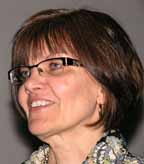Canadian Mennonite
Volume 12, No. 12
June 9, 2008
Leading leaders
New denominational minister looking forward to nurturing national church pastors, laity
SASKATOON, SASK
 |
Although she doesn’t start until September, Mennonite Church Canada’s latest denominational minister is looking forward to beginning her new job.
Leadership, support, encouragement, resources—these are all things Karen Martens Zimmerly hopes to bring to the role. “My hope and my dream is to work very closely with the area churches—including the area church ministers and the executive staff of the denomination—and really listen and find out where the challenges within MC Canada are,” she says by phone from Grace Mennonite Church, the Saskatoon congregation she and her husband Terry have co-pastored for more than 15 years. According to her, the continual development of leadership models that will serve the church—so that the church can serve the world—is paramount because “that’s what we’re called to be, the church present and active in the world.”
Leadership development is a key part of the job description, Martens Zimmerly says. With the recent pastoral trends survey, MC Canada staff have done preliminary work to find out what the joys and challenges of being a pastor are, and she is eager to be a part of the process to discern what comes next. That will include asking a number of questions: “What are the most effective ways to call pastors and nurture them?” and, “How should MC Canada call young people to pastoral ministry and other avenues of church involvement?”
Martens Zimmerly knows her new role will have its challenges, but says that God calls the church to work together through differences and difficulties. MC Canada may not know what lies ahead, but that’s always been an aspect of what it means to be a part of God’s people, she says, citing Pentecost as an example. Pentecost was a time Jesus’ followers couldn’t have imagined but, nonetheless, they were called to come together and pray for what was happening.
“That’s really my sense of what’s happening in the denomination right now,” Martens Zimmerly says. “Preparatory work is being done. We don’t know exactly where it will lead and I’m being invited to enter that work at this point.”
She points to the diversity within MC Canada. Different churches will find different ways of calling and equipping people for pastoral or other ministries, but the common denominator should be good role models within the church, she maintains.
“As adults, we need to model for [young people] lives of faith that are strong, vibrant and connected to our church communities, as well as in the larger commu-nities we’re a part of,” she says. “We need to show that we are excited about what God has the potential to do and is already doing, and invite young people to participate.”
Connecting with people and working together with them is one of the similarities Martens Zimmerly sees between caring for the spiritual health of a congregation and caring for the spiritual health of an entire denomination. Developing a vision for the church is also something that happens at local and denominational levels. One difference she sees is that the denominational minister role requires more “big-picture thinking” than being a pastor in a local setting does. Being denominational minister means “seeing the big picture of what’s happening in one area of the denomination and being able to bring that to area church leadership,” she says.
Tobyann Willis-Camp is the chair of the board of deacons at Grace Mennonite, and has known Martens Zimmerly for five years. She says Martens Zimmerly “will be a great blessing” to MC Canada. “Karen is someone who doesn’t just barge in when a discussion needs to happen or a decision needs to be made,” says Willis-Camp. “She’s someone who looks at everything. She sits, she looks, she listens, she asks questions, and then she listens some more. Then she advises.”
Martens Zimmerly has an ability to call people to roles in the church and nurture them along the way, Willis-Camp says. When she began attending Grace Mennonite with her family in 2002, Willis-Camp didn’t imagine herself eventually being in leadership. She credits her current role as a deacon in part to Martens Zimmerly. “Every step of the way, Karen’s been really great at saying, ‘These are things you can do, and if you have any questions, we can talk. Don’t fret about these things. Pray about them, talk about them, and let’s see what can happen.’”
Muriel Bechtel, conference minister for Mennonite Church Eastern Canada, is looking forward to the fresh insights Martens Zimmerly will bring. “To have someone coming in who represents the age group of a significant number of our current MC Canada pastors is important,” Bechtel says. “I think, from that perspective, Karen will help us understand what pastors need, and what kind of leaders the church needs as we look to the future.”